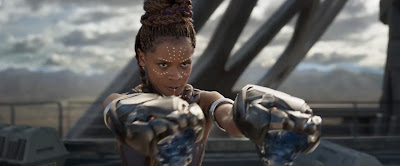Certainly it has been years since my last post. Even still the fire for quality content has not died, though maybe the spring from which non-mainstream media once sprung has now run dry. Today is not a day to lament that however, it is a day to return to writing for the people or for no one. It is a day I write for you about this movie.
(Click Read More to continue)
I have found it difficult to write a review of Black Panther. It has broken sales records and by all
estimations received rave reviews. Yet it is difficult to condense what is for many people a movie long in
incubation of hope that has manifested into a child of dreams. The movie represents for many what has
never truly been seen on a large cinematic scale: Pure black heroism.
The movie centers around T’Challa (Chadwick Boseman), heir to the throne of Wakanda. After the death of his father T’Challa - not without challenge - accepts the his responsibility as King of Wakanda and also as the Black Panther. T’Challa ventures forward with his trusted companions: sometimes girlfriend and goodwill moral compass Nakia (Lupita Nyongo) and the militant and faithful General Okoye (Danai Guria), leader of the badass bald warrior women. Together these three face foe after foe for the plight of Wakandan secrecy.
Erik Killmonger played by Michael B Jordan, is cousin to T’Challa, a boy abandoned by a murdered father who was once prince of Wakanda. Killmonger’s father was sent as a spy out into Oakland by former king T’Chaka, and in his exile he helped set up the theft of Wakandas power: vibranium, the most powerful substance in the world. This theft resulted in many deaths. T’Chaka, upon discovering this kills his brother (played by Sterling K. Brown), orphaning Killmonger and ever since, Killmonger has lived a violent life all in preparation for taking the Wakandan throne.
Surely anyone reading this may know the rest of the film; of how T’Challa and Killmonger fight for the throne and T’Challa’s seeming defeat, T’Challa’s discovery of Killmonger’s origins as a lost descendant of Wakandan royalty, and Killmonger’s eventual doom. The plot is not particularly new and neither are typical themes of redemption, bravery, sacrifice and rebirth that we see so evidently in T’Challa’s rise, fall and reclamation of the throne. In fact, I would argue there are traces of Star Wars and even The Lion King 2 in its plot. But what makes this movie so much different than its Marvel compatriots is its relevance to the plight of people outside the general themes of morality. This film is about blackness, both its good and bad.
Erik Killmonger spearheads the criticism of Wakanda, a technologically advanced country whose reclusivity is a staple among its people. Hiding its wealth from the rest of the world has isolated the people Killmonger feels Wakanda should be helping: black people. Black Panther is a mirror of todaywhere the black plight worldwide is one of liberation and economic freedom, and Killmonger thinks with him at the helm that Wakanda will do more. He is more than just a nemesis, he’s the ethical antagonist, echoing sentiments that other Wakandas have expressed: we must help free our people everywhere. Killmonger’s anger with Wakanda can in ways be placed here in the U.S., maybe for us as the breaker of chains, or for us who wish our chains could be broken. Either way, Killmonger helps breath a tangible life into the idea of black liberation, giving revolution a new battle cry. Michael B. Jordan’s character is heavy throughout the entire film, with brief flashes of humor with lines like “Hey Auntie.” His heaviness sometimes even feels forced and uncomfortable, but with clear intentions and plan, he is a villain we can live with. He is probably Marvel’s best villain to date.
Outside of its philosophical questioning, Black Panther is a testament to black representation both off and on screen. Its cast boasts Oscar winners and nominees like Lupita NYong'o, Angela Bassett, and Forest Whitaker, with more recent breakout stars like Daniel Kaluuya (Get Out), Chadwick Boseman, Letitia Wright and Danai Gurira (The Walking Dead). The side characters have a rightful place all over the movie, making themselves probably more interesting than the Black Panther himself. They add texture and depth to the story, and definitely humor with greetings like “Colonizer,” and somber moments of reflection in the Wakandan heaven (Did anyone else feel like Wakana heaven is reminiscent of Mufasa and Simba in The Lion King?) . Wakanda exists as a character as well, a rich world working better as an abstraction than a physical place, another downside. It would be nice to see more riches of Wakanda than its royalty. Ryan Coogler as captain (director) and co-writer of this film, and has truly breathed a fresh life into the oversaturation of the Marvel franchise. This movie, for its few flaws combines a wide talent of actors for a plot with sturdy black roots, a body of action and philosophical tendrils that make this a true flower.
The direction Coogler gave this film, with themes of classism, race, responsibility and power will hopefully inspire black girls and boys, men and women all over the globe. This movie, regardless of its source material, is not a guiding light but more a shout to the world that blackness is greatness.




No comments:
Post a Comment